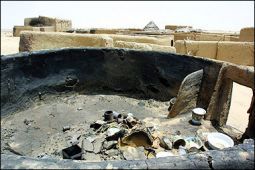Hellish Sudan atrocities and rights abuses recounted in Amnesty report
LONDON, May 25 (AFP) — A detailed litany of rights abuses including mass executions and public rapes was levelled at Sudan’s government forces, its allied militias and some rebel forces on Wednesday in an Amnesty International report.

|
|
The village of Tundubai in Sudan’s Darfur region, presumed to have been burnt down by the marauding Janjaweed Arab militias, is seen in 2004. (AFP). |
The report from the London-based rights watchdog detailed the bombing of civilians, torture, rape, summary executions, unfair trials, hole-in-the-ground prisons, widespread abuses of the 1.8 million displaced persons and a series of broken peace treaties.
“Thousands of civilians were killed and tens of thousands made homeless. Others were abducted. Hundreds of villages were destroyed or looted. Thousands of women were raped, sometimes in public, and many were taken as sexual slaves by soldiers or Janjaweed militiamen,” Amnesty said of conflict in the western region of Darfur.
In early 2004 the Darfur conflict, pitting rebels of black African origin against the Khartoum government, was marked by the use of government Antonov bomber planes and helicopter gunship attacks backed up by sweeps by the local Janjaweed Arabic militia, who were armed and supported by the government.
Hostilities were so bad that in April 2004 a UN Humanitarian Co-ordinator described Darfur as ‘the crisis of our time’ as the Sudanese government refused refugee camps access to food, water and medical aid while the Janjaweed carried out attacks and abuses against them.
The worst of the abuses appear to have been committed in the first few months of 2004, the report suggests.
An April ceasefire and agreement not to target civilians between the government, the Sudan Liberation Army (SLA) and the Justice and Equality Movement (JEM) was broken by all parties.
But the deployment of African Union peace keeping troops in all the main towns by July, and of UN human rights monitors in August at Darfur, has reportedly eased the plight of the population.
In July and September UN resolutions threatened action if the government failed to disarm the Janjaweed, who have since been largely incorporated into Sudanese paramilitary forces such as the Popular Defence Forces, the report said.
In December 2004 some 1.8 million displaced people remained in camps within Darfur or elsewhere in Sudan and more than 200,000 Darfur refugees remained in neighbouring Chad.
However, around 400,000 people displaced in previous years returned to the Bahr al-Ghazal and Equatoria regions.
Southern rebels the Sudanese People’s Liberation Army (SPLA) were accused of cruel, inhuman or degrading punishments such as flogging after summary trials or no trial at all and of running prisons which were simply large holes in the ground.
The government and SPLA have finally cut a definitive power and wealth sharing deal with a long-term plan for the future of the south, but Amnesty said that in Upper Nile region hundreds of Shilluk people were killed and more than 60,000 reportedly displaced, 20,000 of whom remained displaced by the end of last year.
Amnesty detailed several accounts of mass abuse across the country, including one of the rounding up in March by Sudanese military intelligence, army officers and Janjaweed militia of 135 Fur people in 10 villages in Wadi Saleh province who were blindfolded, told to lie on the ground and shot.
An 18-year-old woman described how she and around 45 women were taken from their village by soldiers. She was raped by six soldiers and then kept by another, who has since been arrested, as a sex slave.
The conflict spilled over into neighbouring Chad where incursions by the Janjaweed led to reports of looting and the killing of civilians and clashes between Chadian security forces and the Janjaweed.
There were more than 200,000 Sudanese refugees in Chad, 100,000 of them arriving in 2004. The huge influx combined with the poverty of the local community and militia attacks, led to increasing tensions between the refugees and host communities.
Please read: Amnesty International Report 2005 entry on Sudan
